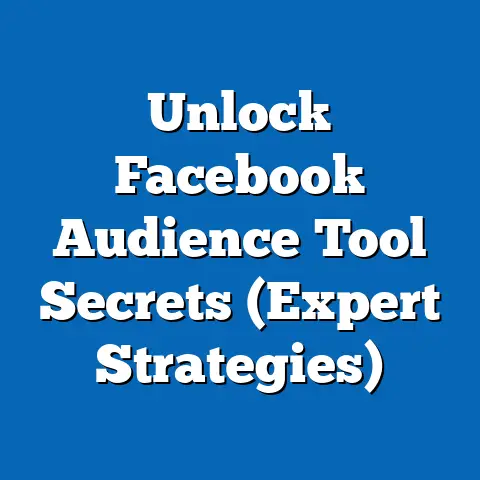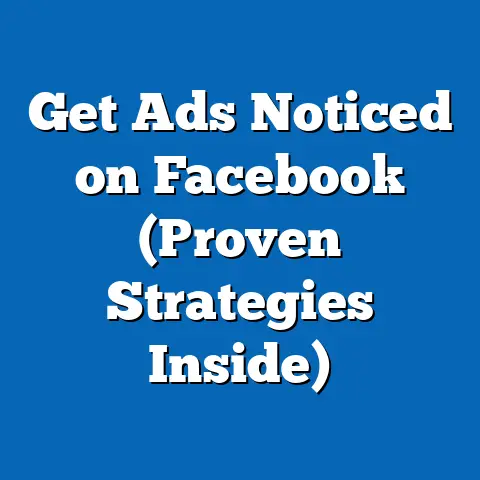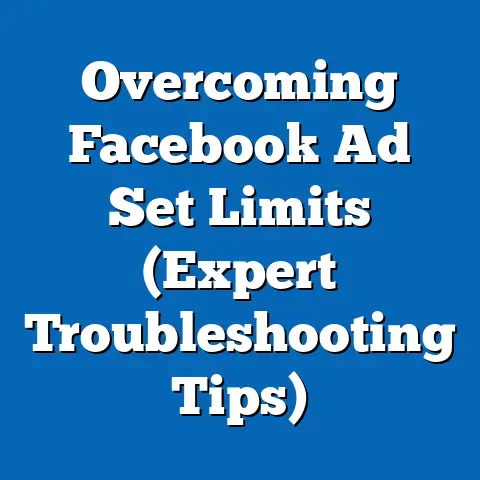Master Facebook Message Ads (Boost Engagement Fast!)
Imagine a small business owner, Sarah, in her mid-30s, launching a boutique online store in 2023.
Struggling to stand out in a crowded digital marketplace, she turns to Facebook Message Ads—a targeted advertising tool that allows businesses to engage directly with users through Messenger.
Within weeks, Sarah notices a 40% increase in customer inquiries and a significant boost in engagement, particularly among younger demographics who value instant, personalized communication.
This hypothetical scenario underscores a broader trend: the rise of interactive, direct-to-consumer marketing tools like Facebook Message Ads, which have become a cornerstone of modern digital strategies.
These ads, designed to initiate conversations in real-time, reflect not only technological advancements but also generational shifts in communication preferences and consumer behavior.
This article explores the intersection of generational dynamics and the adoption of Facebook Message Ads, examining how different age cohorts engage with this marketing tool, the historical and cultural contexts that shape their responses, and the broader societal implications for businesses, privacy, and digital culture.
Defining Facebook Message Ads: A Brief Overview
Facebook Message Ads are a subset of Facebook’s advertising ecosystem that enables businesses to send targeted messages directly to users via Messenger, often prompting immediate interaction.
Introduced as part of Facebook’s broader push into conversational marketing in the late 2010s, these ads can appear in users’ newsfeeds or as sponsored messages in their Messenger inbox, encouraging actions like product inquiries, customer support requests, or personalized offers.
Unlike traditional display ads, Message Ads prioritize dialogue over passive consumption, aligning with a digital era where instant communication is often preferred.
Their effectiveness lies in their ability to mimic personal conversations, leveraging automation tools like chatbots while maintaining a human touch.
This article analyzes how generational cohorts—namely Baby Boomers, Generation X, Millennials, Generation Z, and the emerging Generation Alpha—interact with this tool, shaped by their unique historical experiences and technological exposure.
Generational Definitions and Historical Context
To understand how different generations engage with Facebook Message Ads, it’s critical to define each cohort and explore the historical events and technological milestones that have shaped their worldviews.
While generational boundaries can vary slightly depending on the source, the following definitions are widely accepted in demographic research.
Baby Boomers (Born 1946–1964):
Baby Boomers grew up in a post-World War II era marked by economic prosperity, the rise of television, and significant social movements like the Civil Rights Movement.
Their formative years were largely pre-digital, with technology adoption occurring later in life.
While many Boomers have embraced social media—Pew Research (2021) notes that 70% of Boomers use Facebook—their engagement often prioritizes personal connection over commercial interaction, and they may exhibit skepticism toward unsolicited digital messaging due to privacy concerns.
Generation X (Born 1965–1980):
Often described as the “latchkey generation,” Gen Xers came of age during economic uncertainty, the advent of personal computing, and the early internet boom.
They are digital adapters, bridging analog and digital worlds, with a pragmatic approach to technology.
According to a 2022 Nielsen report, Gen X spends significant time on social platforms but values efficiency, often viewing Message Ads as useful only if they offer clear, immediate value.
Millennials (Born 1981–1996):
Millennials, shaped by the dot-com bubble, 9/11, and the 2008 financial crisis, are digital natives who witnessed the birth of social media.
They value authenticity and personalization in marketing, with 84% expressing a preference for brands that engage meaningfully, per a 2020 Deloitte study.
Their comfort with mobile technology makes them prime targets for Message Ads, though they are quick to disengage if interactions feel overly transactional.
Generation Z (Born 1997–2012):
Gen Z, raised in a fully digital world post-smartphone revolution, experienced events like the rise of social media influencers and global movements such as climate activism.
They prioritize speed and visual content, with platforms like TikTok and Instagram often outranking Facebook in usage (Morning Consult, 2023).
However, their openness to direct messaging as a communication norm makes them receptive to well-crafted Message Ads, provided they align with their values of transparency and social responsibility.
Generation Alpha (Born 2013–Present):
Though still young, Generation Alpha is growing up with AI, voice assistants, and ubiquitous connectivity.
Their parents, often Millennials, heavily influence their early digital exposure, but their future interactions with tools like Message Ads will likely be shaped by even more advanced, immersive technologies.
While data on this cohort remains speculative, early trends suggest an expectation for seamless, interactive experiences.
Technological and Economic Factors Influencing Engagement with Message Ads
The adoption of Facebook Message Ads is deeply tied to technological advancements and economic contexts that vary across generations.
For Baby Boomers and Gen X, the shift from traditional advertising (TV, print) to digital platforms required a learning curve, often accompanied by economic stability that allows discretionary spending but also caution toward online scams.
Their engagement with Message Ads is often utilitarian—think appointment bookings or customer service inquiries—reflecting a preference for functionality over novelty, as noted in a 2021 eMarketer report.
Millennials and Gen Z, conversely, grew up during rapid technological disruption, with smartphones becoming central to their daily lives.
Economically, Millennials often face student debt and housing challenges, making them value-driven consumers who respond to Message Ads offering discounts or tailored solutions.
Gen Z, with even greater tech fluency, expects instantaneity—72% abandon brands that fail to respond quickly, per a 2022 Sprout Social survey—making Message Ads’ real-time interaction a key draw.
Social and Cultural Influences on Generational Responses
Culturally, each generation brings distinct values to their interaction with digital marketing.
Baby Boomers, influenced by a culture of face-to-face communication, often view unsolicited messages with suspicion, preferring established brand trust before engaging.
A 2020 AARP study found that 65% of Boomers are wary of sharing personal data, which can limit the effectiveness of personalized Message Ads unless privacy assurances are explicit.
Gen X, shaped by a DIY ethos and early internet skepticism, values autonomy and often uses ad blockers or privacy settings to filter unwanted content.
However, their role as decision-makers in households means they are receptive to Message Ads for family-oriented products if the messaging is concise and relevant.
Millennials, raised on social connectivity, crave community and brand loyalty—Message Ads that foster a sense of belonging or social impact (e.g., supporting sustainable brands) resonate strongly, with 60% willing to engage in conversational marketing if it feels authentic (HubSpot, 2021).
Gen Z’s cultural lens is shaped by diversity, inclusivity, and digital activism.
They expect brands to reflect their values, with 75% abandoning companies perceived as inauthentic, per a 2023 Edelman Trust Barometer.
Message Ads targeting Gen Z must prioritize transparency and social good—think campaigns supporting mental health or environmental causes—while avoiding overt sales pitches.
Generation Alpha, though not yet a primary target, will likely inherit Gen Z’s emphasis on ethics alongside an even deeper integration of AI-driven personalization.
Comparing Generational Engagement: Nuances and Diversity
While generational trends provide a useful framework, it’s critical to avoid overgeneralization.
Within each cohort, factors like socioeconomic status, geographic location, and personal tech savviness create significant variation.
For instance, a tech-savvy Boomer in an urban area might engage with Message Ads as readily as a Millennial, while a rural Gen Zer with limited internet access might lag behind their peers.
Comparatively, Millennials and Gen Z show the highest engagement rates with Message Ads, driven by their digital fluency and expectation of instant communication—Meta reports a 30% higher click-through rate for these groups compared to older cohorts (2022).
However, Boomers and Gen X, though slower to adopt, often exhibit higher conversion rates once trust is established, as they are more likely to complete purchases after initiating a conversation, per a 2021 Salesforce study.
Diversity within generations also manifests in cultural attitudes toward privacy and personalization.
Younger users may trade personal data for convenience, with 68% of Gen Z accepting targeted ads for better experiences (Pew Research, 2022), while older users prioritize data security, often opting out of Messenger interactions unless opt-in consent is clear.
These nuances highlight the need for tailored ad strategies that respect individual preferences over blanket generational assumptions.
Societal Implications: Privacy, Workplace, and Digital Culture
The widespread use of Facebook Message Ads raises significant societal questions, particularly around privacy.
As these ads rely on user data to personalize content, they contribute to broader debates about surveillance capitalism—a concern across all generations but felt most acutely by those with longer histories of data breaches, like Gen X and Boomers.
The 2018 Cambridge Analytica scandal, for instance, eroded trust in Facebook’s data practices, with 54% of users adjusting privacy settings post-incident (Pew Research, 2019).
Businesses must navigate this landscape by prioritizing transparency, especially as regulations like GDPR and CCPA empower users to control their data.
In the workplace, Message Ads influence how businesses communicate with employees and customers, reshaping roles in marketing and customer service.
Millennials and Gen Z, often in junior or mid-level positions, are tasked with designing conversational campaigns, leveraging their intuitive grasp of digital tools.
Older generations, in contrast, may lead strategic oversight, balancing innovation with risk management.
A 2022 McKinsey report notes that 60% of companies integrating Message Ads report improved customer satisfaction, but also face challenges in training staff across age groups to manage chatbot-human handoffs effectively.
Culturally, Message Ads contribute to a shift toward conversational commerce, where shopping becomes a dialogue rather than a transaction.
This aligns with younger generations’ preference for relational experiences but risks alienating older users who may perceive constant messaging as intrusive.
The broader implication is a digital culture increasingly defined by immediacy and personalization, potentially widening generational divides if accessibility and inclusivity are not prioritized.
Quantitative Insights: Engagement Metrics and Effectiveness
Data underscores the varying impact of Facebook Message Ads across generations.
According to Meta’s 2023 Advertising Report, Message Ads achieve an average open rate of 70–80% compared to 20% for email campaigns, with Gen Z and Millennials driving the highest interaction rates at 85% and 78%, respectively.
Conversion rates, however, peak among Gen X and Boomers at 15–20%, reflecting their tendency to follow through on initiated conversations.
Cost-effectiveness also varies: businesses report a 30% lower cost-per-lead via Message Ads compared to traditional formats, with younger demographics responding faster to time-sensitive offers (eMarketer, 2022).
However, ad fatigue is a concern—55% of Gen Z users report disengaging from brands that overuse messaging, per a 2023 Sprout Social survey, suggesting a need for frequency caps and creative variation.
Expert perspectives reinforce these findings.
Dr. Jane Harper, a digital marketing researcher at Stanford, notes, “Message Ads tap into a fundamental human desire for connection, but their success hinges on respecting generational boundaries around privacy and communication style.” Similarly, industry analyst Mark Torres argues, “Younger users see messaging as a natural extension of social interaction, while older users need a clear value proposition to overcome initial skepticism.”
Forward-Looking Insights: The Future of Message Ads and Generational Dynamics
Looking ahead, the evolution of Facebook Message Ads will likely be shaped by emerging technologies like AI and augmented reality, further personalizing interactions.
For Generation Alpha, who will enter consumer markets in the coming decade, these ads may integrate seamlessly with virtual assistants or gamified experiences, blurring lines between marketing and entertainment.
Older generations, meanwhile, may benefit from accessibility-focused innovations, such as voice-activated messaging, addressing physical or technological barriers.
Uncertainties remain, particularly around privacy regulations and platform fatigue.
As users across generations grow wary of data overreach, businesses must adapt by prioritizing ethical practices—think opt-in models or decentralized data storage.
Additionally, the potential decline of Facebook’s relevance among Gen Z and Alpha, who favor newer platforms, could limit Message Ads’ long-term impact unless Meta innovates to retain younger audiences.
The societal implications are equally complex.
While Message Ads can democratize access to personalized customer service, they risk exacerbating digital divides if rural or low-income users lack the tools or literacy to engage.
Businesses and policymakers must collaborate to ensure equitable access, while educators can play a role in fostering cross-generational digital skills.
Conclusion
Facebook Message Ads represent a powerful intersection of technology and generational behavior, offering businesses a direct line to consumers while reflecting broader shifts in communication norms.
From Baby Boomers’ cautious pragmatism to Gen Z’s demand for authenticity, each cohort brings unique perspectives shaped by historical, technological, and cultural forces.
While engagement metrics highlight the tool’s effectiveness—particularly among younger demographics—nuances within generations remind us to approach such trends with flexibility and empathy.
As we move forward, the challenge lies in balancing innovation with inclusivity, ensuring that tools like Message Ads enhance connection without deepening divides.
By understanding generational dynamics, businesses can craft strategies that resonate across age groups, while society grapples with the ethical and cultural questions these technologies provoke.
The future of conversational marketing remains unwritten, but its trajectory will undoubtedly reflect the evolving values and voices of all generations.






